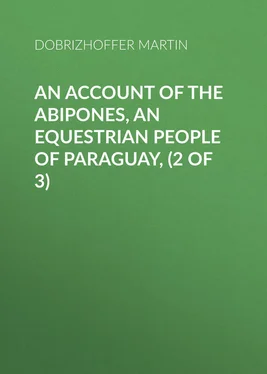Martin Dobrizhoffer - An Account of the Abipones, an Equestrian People of Paraguay, (2 of 3)
Здесь есть возможность читать онлайн «Martin Dobrizhoffer - An Account of the Abipones, an Equestrian People of Paraguay, (2 of 3)» — ознакомительный отрывок электронной книги совершенно бесплатно, а после прочтения отрывка купить полную версию. В некоторых случаях можно слушать аудио, скачать через торрент в формате fb2 и присутствует краткое содержание. Жанр: foreign_antique, foreign_prose, на английском языке. Описание произведения, (предисловие) а так же отзывы посетителей доступны на портале библиотеки ЛибКат.
- Название:An Account of the Abipones, an Equestrian People of Paraguay, (2 of 3)
- Автор:
- Жанр:
- Год:неизвестен
- ISBN:нет данных
- Рейтинг книги:3 / 5. Голосов: 1
-
Избранное:Добавить в избранное
- Отзывы:
-
Ваша оценка:
- 60
- 1
- 2
- 3
- 4
- 5
An Account of the Abipones, an Equestrian People of Paraguay, (2 of 3): краткое содержание, описание и аннотация
Предлагаем к чтению аннотацию, описание, краткое содержание или предисловие (зависит от того, что написал сам автор книги «An Account of the Abipones, an Equestrian People of Paraguay, (2 of 3)»). Если вы не нашли необходимую информацию о книге — напишите в комментариях, мы постараемся отыскать её.
An Account of the Abipones, an Equestrian People of Paraguay, (2 of 3) — читать онлайн ознакомительный отрывок
Ниже представлен текст книги, разбитый по страницам. Система сохранения места последней прочитанной страницы, позволяет с удобством читать онлайн бесплатно книгу «An Account of the Abipones, an Equestrian People of Paraguay, (2 of 3)», без необходимости каждый раз заново искать на чём Вы остановились. Поставьте закладку, и сможете в любой момент перейти на страницу, на которой закончили чтение.
Интервал:
Закладка:
CHAPTER IX.
OF THE CONJURORS, OR RATHER OF THE JUGGLERS AND CHEATS OF THE ABIPONES
If I remember rightly, no nation which has been discovered in Paraguay is without its jugglers, whom the Abipones call by the name of the devil, Keebèt, or devilish workers, because they believe them to have received from their grandfather, the evil spirit, the power of performing wonderful work far surpassing human art. These rogues, who are of both sexes, profess to know and have the ability to do all things. There is not one of the savages who does not believe that it is in the power of these conjurors to inflict disease and death, to cure all disorders, to make known distant and future events; to cause rain, hail, and tempests; to call up the shades of the dead, and consult them concerning hidden matters; to put on the form of a tiger; to handle every kind of serpent without danger, &c., which powers, they imagine, are not obtained by art, but imparted to certain persons by their grandfather, the devil. Those who aspire to the office of juggler are said to sit upon an aged willow, overhanging some lake, and to abstain from food for several days, till they begin to see into futurity. It always appeared probable to me that these rogues, from long fasting, contract a weakness of brain, a giddiness, and kind of delirium, which makes them imagine that they are gifted with superior wisdom, and give themselves out for magicians. They impose upon themselves first, and afterwards upon others. But in reality they differ from the rest in nothing but the superior ability of concerting frauds to deceive others. Indeed it is no difficult matter to cheat ignorant and credulous savages, who account every new thing, which they have never seen before, a prodigy, and immediately attribute it to magic art. Once when I happened to make some roses of red linen, to adorn the church, the Indians watched me at my work with much interest, wondering at this imitation of nature, and exclaiming, "This father is either a magician, or the son of a witch." A European lay-brother of our order astonished the Indians by turning something of wood, with much skill and expedition, and was consequently spoken of by them all as the prince of magicians; for till that day they had never seen a turning machine, nor any thing turned. Were they to behold fireworks, optical glasses, the experiments of the air-pump, and many other things which are every-day sights amongst Europeans, amazed at what would be so novel to their eyes, they would indeed swear them to be absolute proofs of magical art. This is confirmed by the circumstance of the Brazilians calling their conjurors Payè , and the art of working miracles Caraybà , which name they afterwards gave to the European strangers, because they saw them perform things by art which, being formerly unknown to them, they imagined above the powers of nature. Hence also the Guaranies, whose language bears much resemblance to that of Brazil, at this day call all the Spaniards and Europeans Caraỳ .
This simplicity of an ignorant people, the crafty jugglers know well how to turn to their own advantage, openly boasting themselves vicegerents and interpreters of the devil, their grandfather; diviners of future events; priests of the mysteries; creators, or, as they please, healers of diseases; necromancers, and governours of all the elements; easily persuading these credulous creatures any thing that comes into their heads. They are furnished with a thousand arts of deceiving. Suppose they have heard from some savage visitant that an enemy is coming to attack the horde; this knowledge they will boast of to their hordesmen as if it had been revealed to them by their grandfather, thus acquiring the reputation of prophets. Whatever they learn either from conjecture, from secret intelligence, or from their own examination, they predict to be about to happen with infinite pomposity, and are always listened to with as much attention as if they were actually inspired. Should their prophecies not be approved by the event, they are never at a loss for excuses to shelter their authority. Sometimes, in the dead of the night, they suddenly announce the enemy's approach with a whistle or a pipe. All are awakened, and without once calling in question the truth of the juggler's prediction, fly to arms. The women and children betake themselves to a place of safety, and whilst they pass hours, nay whole nights, in the fear of death, and their husbands in threatening it to the assailants, not one of the enemy makes his appearance. But that the faith in their prophecies, and the authority of the prophets, may suffer no diminution, they declare, with a smile, that the hostile assault has been averted by their grandfather the devil. At other times a body of enemies often rushes upon them on a sudden, when not one of these prophets has either foreseen or foretold the danger of an attack. A ridiculous event, à propos to this subject, occurs to my recollection. About night-fall an Abiponian boy brought an iron bridle, an axe, and some other trifles, the treasures of his family, to be guarded in my house. On being asked the reason of his doing so, he replied that the enemies would arrive in the night; for so it had been predicted by his mother, a famous juggler, who declared that whenever the enemy was approaching, she felt a pricking sensation in her left arm. "Oh!" replied I, "you may attribute that to the fleas, my good lad. I can tell you this on my own experience. Day and night I feel my left and my right arm too, as well as other parts of my body, insolently pricked and stung by fleas. If that were an indication of the enemy, we should never be free from their attacks night or day." But my words were vain; for the report of the old woman's presage got abroad, and disturbed the whole town all night. Yet, as often happened, no sign or vestige of the enemy appeared.
The Abipones, whom the desire of booty or glory induces to be constantly scheming war against others, are, in consequence, never free from suspicions of machinations against themselves. The more ardently they desire to take measures for their safety, the more readily do they believe themselves in danger from others, and generally for some foolish reason. A light rumour, smoke seen from a distance, strange foot-marks, or the unseasonable barking of dogs, fills them with suspicions that their lives are in danger from the enemy, especially when they dread their vengeance for slaughters which themselves have lately committed. The task of tranquillizing and preparing their minds devolves upon the jugglers, who, whenever any thing is to be feared, or any thing to be done, consult the evil spirit. About the beginning of the night a company of old women assemble in a huge tent. The mistress of the band, an old woman remarkable for wrinkles and grey hairs, strikes every now and then two large discordant drums, at intervals of four sounds, and whilst these instruments return a horrible bellowing, she, with a harsh voice, mutters kinds of songs, like a person mourning. The surrounding women, with their hair dishevelled and their breasts bare, rattle gourds, and loudly chaunt funeral verses, which are accompanied by a continual motion of the feet, and tossing about of the arms. But this infernal music is rendered still more insupportable by other performers, who keep constantly beating pans which are covered with deers' skin, and sound very acutely, with a stick. In this manner the night is passed. At day-break all flock to the old woman's tent, as to a Delphic oracle. The singers receive little presents, and are anxiously asked what their grandfather has said. The replies of the old women are generally of such doubtful import, that whatever happens they may seem to have predicted the truth. Sometimes the devil is consulted by different women, in different tents, the same night. At day-break one party will pertinaciously assert that the enemy are on the approach, which the other as obstinately denying, a conflict of opinions ensues between these foolish interpreters of oracles, which generally ends in a bloody quarrel. Sometimes one of the jugglers is desired to call up the shade of a dead man, from which they may immediately learn what their fates reserve for them. A promiscuous multitude of every age and sex flocks to the necromancer's tent. The juggler is concealed beneath a bulls hide, which serves in the same manner as a stage-curtain. Having muttered a few extemporary verses, sometimes with a mournful, at others with a commanding voice, he at length declares that the shade of such a person, whoever the people choose, is present. Him he interrogates over and over again on future events, and, changing his voice, answers to himself whatever he thinks proper. Not one of the auditors dares to doubt of the presence of the shade, or the truth of its words. An Abipon of noble family and good understanding, used many arguments to convince me that he had with his own eyes beheld the spirit of an Indian woman, whose husband was then living in our town. Spaniards also, who have lived from boyhood in captivity amongst the Abipones, are quite persuaded that the shades of the dead become visible at the call of a necromancer, that they reply to questions, and that there is no deceit used in the business. But what sensible man would credit such witnesses, who are in the daily habit of deceiving and being deceived?
Читать дальшеИнтервал:
Закладка:
Похожие книги на «An Account of the Abipones, an Equestrian People of Paraguay, (2 of 3)»
Представляем Вашему вниманию похожие книги на «An Account of the Abipones, an Equestrian People of Paraguay, (2 of 3)» списком для выбора. Мы отобрали схожую по названию и смыслу литературу в надежде предоставить читателям больше вариантов отыскать новые, интересные, ещё непрочитанные произведения.
Обсуждение, отзывы о книге «An Account of the Abipones, an Equestrian People of Paraguay, (2 of 3)» и просто собственные мнения читателей. Оставьте ваши комментарии, напишите, что Вы думаете о произведении, его смысле или главных героях. Укажите что конкретно понравилось, а что нет, и почему Вы так считаете.












